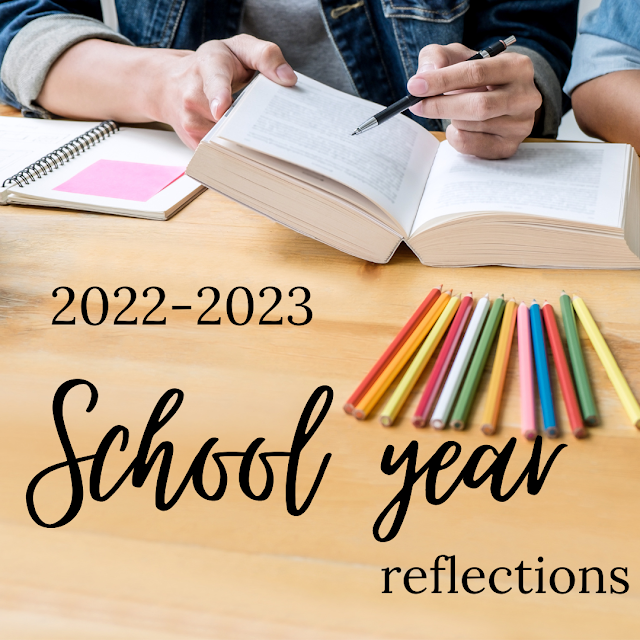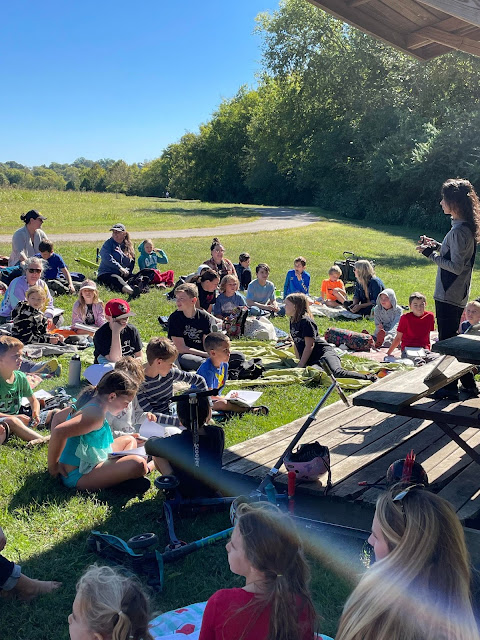End of the year 2022-2023
I turned in my attendance and grades to HomeLife this week so I thought it was the perfect time to blog and reflect on our school year and what we were able to accomplish! If you look back at my planning post (here) from August last year, you can see how I organized our subjects into the categories "Knowledge of God" "Knowledge of Man" and "Knowledge of the Universe."
This categorization makes so much sense to me. For years I thought it was just a Charlotte Mason way of organizing knowledge but it goes back so much farther. For example, Aristotle also organized knowledge in these categories: Episteme, Techne and Phronesis. Episteme means scientific knowledge (Knowledge of the Universe) Techne means knowledge of craft (Knowledge of Man) and Phronesis means ethical knowledge (Knowledge of God.)
Later, Matthew Arnold also wrote about these three categories. Charlotte Mason writes about it in Volume 6: "For ignorance there is only one cure, and that is, knowledge; his school is the seat of knowledge for a child, and whatever else his teachers do for him, first of all they must sustain him with knowledge, not in homeopathic doses, but in regular, generous servings. If we ask, what is knowledge?––there is no neat and ready answer at hand: Matthew Arnold, we know, classifies all knowledge under three heads,––the knowledge of God, divinity, the knowledge of man, known as the 'humanities' and the knowledge of the physical world, science, and that is enough to go on with. But I should like to question this division and to class all three parts of knowledge under the head of Humanism, which should include all knowledge that makes a direct appeal to the mind through the channel of literary form; now, the substance of Divinity is contained in one of the three great literatures of the world, and Science, in France if not usually in England, is embodied in a beautiful and poetic literature of great clarity, precision and grace. Is it not then allowable to include all knowledge of which literature is a proper medium under the head of 'Humanism'? One thing at any rate we know with certainty, that no teaching, no information becomes knowledge to any of us until the individual mind has acted upon it, translated it, transformed, absorbed it, to reappear, like our bodily food, in forms of vitality. Therefore, teaching, talk and tale, however lucid or fascinating, effect nothing until self-activity be set up; that is, self-education is the only possible education; the rest is mere veneer laid on the surface of a child's nature."
Ever since I first read about these divisions I have structured our school under each classification. You can go back through my blog and see planning posts from 2018, 2019, 2020, 2021, and last year, 2022. Previously, I still used a Charlotte Mason curriculum but I organized by individual subjects.
So, how did this year go?
AMAZING! For our family, community is such an important part of our learning. In this recap I'll touch on how our community learning fit within our three classifications of knowledge. First, we'll look at our PLUS co-op. This fulfilled the Latin, Plutarch, and Science subjects of our curriculum. We met once a month to share written narrations, participate in hands on science experiments, and introduce our Latin vocabulary and homework for the month.
Just like our science co-op last year, the written narrations were my favorite aspect of this class structure. It is a HUGE benefit for students to hear how other children compose their narrations. The individuality stands out and there is an added benefit of practicing public speaking!
Gathering all the experiment supplies once a month was a big job, but I felt that experiments were the lacking aspect of our homeschool in previous years. This was probably the favorite activity in our monthly meetings! We did simple chemistry and weather experiments this year. To keep everyone on the same page (literally!) I made a schedule for our co-op and sent weekly messages to everyone for reminders and helpful links.
One of these days I might make up a download for others to follow this schedule - I'll add it to my homeschool "to-do" pile! LOL!
Another community learning activity was book clubs! We had both "frills" and "no-frills" meetings to discuss the literature we read through the year! Our "no-frills" books were: Black Ships Before Troy and Wanderings of Odysseus, Birchbark House, Lion to Guard Us, Walk the World's Rim, Kim and Treasure Island. These 9 books represented literature for both history and literature. We met mainly for discussion. Our message thread was also very helpful because the moms could share resources that enhanced the learning of these books!
Our W+F book parties were definitely filled with "frills" like food, games, and activities! Our books for this book club included Cricket in Times Square, Jungle Book, The Lion, the Witch and the Wardrobe, Fortunately the Milk, Shouting at the Rain, and Harriet the Spy. I used some BraveWriter guides with these books to tie in literary elements for our homeschool. To read more about each party I have a webpage dedicated to these fun parties with lots of pictures and ideas! Click here to visit!
Herb Fairies was a continuation this year from last year. I started our learning group in February 2022 (the second semester of last school year) and we finished in May 2023 with a big herb party! There are 13 books in the series and each month we read about the herb, completed the pages in our Herb Fairy journal, and met together for observations and activities! Sometimes it was to eat a prepared dish like homemade marshmallows, sometimes it was to create a medicinal treatment like lemon balm bug spray or pine needle cleaning vinegar!
Nature Adventure was also a fun community activity for monthly nature object lessons! This year we studied turtles, water penny beetles, frogs and toads, tree bud scales, birds of prey, cedar glades, bird taxonomy, snakes, stars and constellations, and also took a full moon hike! Like our W+F book clubs I also keep a record of our Nature Adventure lessons that you can check out here for more pictures and ideas!
Our Wild Explorer group met once a month for field trips that allowed us to complete assignments in each level. This was our last year to meet and we completed all our badges! Woo hoo! The program is similar to any scouting program. We had various nature assignments as well as service projects to complete. I recommend it for anyone who might have a busy schedule and wants to do scouts but doesn't have a lot of extra time.
Our Feast of Riches group met once a month to rotate through poetry recitation, artist study, composer study, nature study, folk songs, and hymns! Poetry tea time was the favorite for my kids! I love that Melissa hosted and planned this tradition to make recitation an enjoyable experience for everyone!
It was also wonderful to be a part of this co-op because Shannon led activities for the artist each term and brought materials like paint, clay, and canvases!
And Megan led us in some fun nature experiences like tasting raw goat milk!
And of course, I love our composer parties! I did activities with both our Feast of Riches Co-op and a group of families that use Composer Study Companion!
A small geography community we did this year was with a subscription to the Universal Yum Box. We had low key parties at our house with friends to taste the different foods from around the world! To make it academic, I pulled out maps and books to look closer at each culture that month. I've kept the small posters next to our world map and we occasionally talk about the countries, culture, and food around the dinner table! The countries we sampled this year were India, South America, South Korea, Spain, Italy, Austria, Brazil, Netherlands, Belgium, and Taiwan. I think Italy was our favorite!
In order to do all these amazing communities we DID stay home for our homeschool! LOL! All the reading, written narrations, math, Bible, and more were done at home during times that we were not out and about. I've had friends ask about how I plan and schedule our curriculum. One thing that I love is having a flow chart on my fridge with all the upcoming events!
I made this last summer and filled in any changes each month. I really like operating on a semester and monthly goal plan rather than a 12 week term. I still fit term things like composers and artists within the 36 weeks/3 term divisions, but looking at school from a month to month planning perspective fits my style much better.
I'm already looking forward to next year! I have two Form 3 students! Both Christian and Eva Mae are middle school (grades 6 and 8 this coming school year) and will have some incredible learning opportunities during the year! So many new living ideas and a feast of information will be presented next year! If you have students in grades 6, 7, or 8th message me and I can tell you about some community learning opportunities!
"Let us try, however imperfectly, to make education a science of relationships—in other words, try in one subject or another to let the children work upon living ideas. In this field small efforts are honoured with great rewards, and we perceive that the education we are giving exceeds all that we intended or imagined." - Vol 3 p163
























Comments
Post a Comment